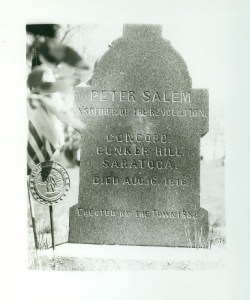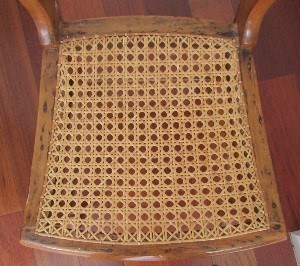Peter Salem (c.1750 – 1816) was a slave born in Framingham. His first owner was Jeremiah Belknap, who later sold him to Lawson Buckminster, a lieutenant under Captain Simon Edgell. During the Revolutionary War, a war to make the colonies free from England, Peter Salem was given his freedom from slavery for a short time so that he could fight for the colonies. He joined Captain Simon Edgell’s company of minutemen – men who had to be ready to fight at a moment’s notice – and fought in the battles at Lexington and Concord on April 19, 1775. Five days later, he transferred to Captain Thomas Drury’s company which was part of Col. John Nixon’s 5th Massachusetts Regiment. On June 17, 1775, Drury’s company fought in the Battle of Bunker Hill, the first major battle of the American Revolution. It was in this battle that British Major John Pitcairn was killed by an African American soldier. It may be that Peter Salem fired the shot that killed Pitcairn.

On November 12, 1775, General George Washington decreed that no blacks, either slaves or freedmen, could serve in the military. When news that the governor of Virginia had freed all slaves willing to fight against the British reached Washington, he issued a new edict on December 30, 1775 (and approved by the Continental Congress on January 16, 1776) allowing all free blacks to serve in the military. Peter Salem was released from slavery and he re-enlisted in the military. He also fought in the Battle of Saratoga, New York in September 1777, and the Battle at Stony Point, New York in July 1779. Peter Salem served in the military for a total of seven years.

After the war, Salem settled in the Sucker Pond area of Framingham and made a meager living caning chair seats and making and mending baskets. Peter was also known as a storyteller. Children and adults alike enjoyed listening to his stories about the war. In 1783, he married Katy Benson. Peter and Katy had no children. Eventually he moved to Leicester, Massachusetts hoping to find work. There he continued to eke out a living weaving baskets and caning chairs. Peter never prospered and in his old age he was dependent on charity. The town officials in Leicester eventually sent him back to Framingham to live in the poorhouse. His former masters, Lawson Buckminster and Jeremiah Belknap, gave monies to the town to support Salem for the rest of his life. Peter died on August 16, 1816 and is buried in the Old Burying Ground in Framingham. In 1882, the town of Framingham erected a monument at his gravesite.
Further Reading
Carp, Benjamin L. “Bunker Hill, Battle of.” Encyclopedia of the New American Nation, edited by Paul Finkelman, vol. 1, Charles Scribner’s Sons, 2006, pp. 231-232. U.S. History in Context,
“Black Patriots of the American Revolution.” Wallbuilder Report: Black History Issue, 2004. https://wallbuilders.com/black-history-issue-2004/. Accessed 1 Feb. 2017.
Bibliography
Davis, Burke. Black Heroes of the American Revolution. Harcourt, Brace & Co., 1976.
Dennis Wepman. “Salem, Peter.” American National Biography Online Feb. 2000. http://www.anb.org/articles/06/06-00893.html. Accessed 04 Feb 2017.
Herring, Stephen. Framingham: An American Town. Framingham Historical Society, The Framingham Tercentennial Commission, 2000.
“Peter Salem.” Notable Black American Men, Book II, edited by Jessie Carney Smith, vol. 2, Gale. Biography in Context, libraries.state.ma.us/login?gwurl=http://link.galegroup.com/apps/doc/K1622000743/BIC1?u=fpl&xid=448c494f. Accessed 4 Feb. 2017.
Quintal, George. Patriots of Color: A Peculiar Beauty and Merit, African Americans and Native Americans at Battle Road and Bunker Hill. Division of Cultural Resources, Boston National Historical Park, 2004, pp. 189-196. Internet Archive, https://archive.org/stream/patriotsofcolorp00quin#page/189/mode/1up. Accessed 1 Feb. 2017.
Russell, Thaddeus. “Peter Salem.” Encyclopedia of African-American Culture and History, Gale, 2006. Biography in Context, libraries.state.ma.us/login?gwurl=http://link.galegroup.com/apps/doc/K3444701117/BIC1? u=fpl&xid=29b9e5ba. Accessed 4 Feb. 2017.
Temple, Josiah H. History of Framingham, Massachusetts, 1640-1885. A special Centennial year reprinting of the 1887 edition, New England History Press, 1988.